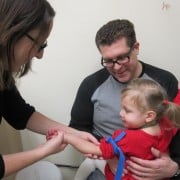Five Steps to Respecting Ourselves and Others Even When We Feel Like Crap
Celiac disease makes us feel like crap in many ways, and when we feel like crap, it’s easy to behave badly.

Sherry Scheideman, Celiac, M.A., Registered Clinical Counsellor
- Celiac Counsellor’s Corner* is a place where Sherry Scheideman, M.A., Registered Clinical Counsellor, responds to your questions about the emotional and social issues that celiacs face. Diagnosed with celiac disease herself in 2001 in Victoria, BC, Sherry draws upon personal experiences and a Master’s Degree in Counseling to support you in transcending this ‘life transition’ and turning it into an opportunity to live your best life – ever.
If you have a comment or question for Sherry, click here.
When we’re behaving badly, we’re not respecting our own dignity, and we’re not respecting the right of other people to live in a peaceful environment.
After behaving badly, we look back at what we said and did, and we look around at the effects, and we feel like crap. This leads us back into the negative cycle of behaving badly.
To break free of this cycle, we need to know that we have the power to respect ourselves and others even when we feel like crap.
To develop this power takes work, just like it takes work to develop muscles at the gym. In this case, the work involves developing the ability to:
- Notice that you feel like crap.
- Pause.
- Observe your emotions and physical sensations.
- Give yourself compassion.
- Choose how to behave.

Here are a couple of examples of celiac disease making us feel like crap – or, as we could say, generously providing us with opportunities to develop these abilities:
- You go to the doctor for celiac issues and the doctor doesn’t know anything about it. Try the five steps:
- Oh, no, I can’t believe it! What a waste of time. (Notice)
- Pause.
- I feel angry. My jaw is clenched. I have electric zaps shooting around in my chest and head. (Observe)
- This is hard for me – I’m suffering right now. I’m going to hug myself like I would hug a suffering friend. (Give)
- I’m going to calmly inform the doctor that I need a referral to a celiac specialist. (Choose)
- Everyone at the office is eating cake that you can’t have. Go through the five steps:
- Oh, no, not again! Why don’t they get it? (Notice)
- Pause.
- I feel jealous and hurt. My heart feels constricted. There’s a tightening in my throat. (Observe)
- This is hard for me – I’m suffering right now. I’m going to hug myself like I would hug a suffering friend. (Give)
- I’m going to step out for a breath of fresh air. (Choose)
You can even use these five steps to help your celiac children, as follows:
- Your celiac child has been glutened and is acting out. Go through the five steps with your child:
- “It seems like you might be feeling crappy.” (Notice)
- “Let’s sit with this for a moment.” (Pause)
- “What do you notice inside?” You can help the child come up with words such as anger, frustration, buzzing, prickles, jumpy, twitchy, fidgety, jittery, etc., as appropriate. (Observe)
- “This is hard for you. It hurts.” (Give)
- “Would you like to ______?” You can make a few suggestions of appropriate actions, such as doing jumping jacks, singing or drumming, playing catch, resting, etc.. (Choose)
These five simple steps will help you to interrupt the negative cycle. Behaving with dignity and respect even when things are difficult can be very empowering. With practice, just like other healthy exercise, you will find that it becomes a natural response – one that you make without thinking about it – and feeling like crap will not affect you as badly.
Sherry
- Contact Sherry
- View previous Celiac Counsellor Corners enter ‘Sherry‘ into the search field at the top right of this page

“Life happens! Why not love it?”
“Being diagnosed with celiac disease and going gluten-free has challenged me to develop inner resources that I never knew I had, and I’m grateful for that. As a counsellor, I love to help other celiacs find their own gifts within the challenges of the disease, and to facilitate healing. Why not let your celiac disease motivate you to be your best self?”
- About Sherry Scheideman
- What happens in a session?
- Not in Victoria? No Problem. Sherry does Skype
- Be inspired – Sherry’s Blog
- Sherry Scheideman on Facebook
- Contact Sherry
-
- *Information and perspectives provided in Celiac Counsellor’s Corner are intended to provide general information, without independent verification on the part of The Celiac Scene for the accuracy of the information provided to it. The information is specifically not intended to be a substitute for medical diagnosis or treatment by your physician or other health care professional. You should always consult your own physician or other health care professionals about any medical questions, diagnosis, or treatment, especially before trying any diet. The Celiac Counsellor’s Corner does not accept any liability for any injury, loss or damage incurred by use of or reliance on any content contained herein.













